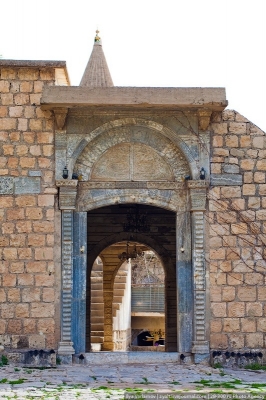The 1872 Petition. Yezidism – its background observances and textual tradition

Philip G. Kreyenbroek
Part 7
In view of the evident academic disdain for accounts based on local research of the oral traditions of Yezidism, it was perhaps fortunate for the progress of the study of the sect that towards the end of the nineteenth century a written document appeared which was soon regarded by some as "the locus classicus on the subject of the Yezidi religion" 45 This was a petition to the Ottoman Government to exempt the Yezidis from military service,46 drawn up in 1872 by the secular and religious authorities of the community. It contained an exposition of the main observances of the faith as perceived by its contemporary leaders. English and German versions of the text were published in the last decade of the nineteenth century, French and Italian versions were to follow later.47 The following is a summary of the text:
(1) It is impossible for Yezidis to serve in the army.
(2) Every Yezidi must visit the image of Melek Tawus three times a year, in April, September and November49 of the Julian calendar. If they fail to do so they become unbelievers.
(3) Every member must visit the shrine of Sheykh Adi at least once a year, from 15 to 20 September.
(4) At sunrise every member must go to a place where he can see the rising sun.
(5) Every Yezidi must kiss the hand of his 'Brother of the Hereafter' who is the servant of the Mehdt, and the hand of his Sheykh or his Pir every day.
(6) When a Yezidi dies, his 'Brother of the Hereafter', or his Sheykh or Pir, or one of the Qewwals, must be with him
(7) We have a thing called the 'blessing of Sheykh Adi', namely earth from his tomb. Every Yezidi must carry some of this in his pocket.If this earth Is not found upon him when he dies, he dies an unbeliever.
(8) A Yezidi, if he wishes to fast, must do so at home, not elsewhere. Every day of the fast he must go to the house of his Sheykh or54 Pir in the morning to begin his fast, and to break his fast he must return there to drink two or three glasses of the holy wine of the Sheykh or Pir. If he fails to do this his fast is not acceptable.
(9) If a Yezidi travels abroad and stays there for at least a year,55 when he returns home his wife is unlawful for him and none of us may give him a wife.
(10) If a Yezidi has a new shirt made, he must dip it in the holy water of the shrine of Sheykh Adi before puttting it on.
(11 )We may not wear dark blue clothes.
Tags:
The 1872 Petition. Yezidism – its background observances and textual tradition

Philip G. Kreyenbroek
Part 7
In view of the evident academic disdain for accounts based on local research of the oral traditions of Yezidism, it was perhaps fortunate for the progress of the study of the sect that towards the end of the nineteenth century a written document appeared which was soon regarded by some as "the locus classicus on the subject of the Yezidi religion" 45 This was a petition to the Ottoman Government to exempt the Yezidis from military service,46 drawn up in 1872 by the secular and religious authorities of the community. It contained an exposition of the main observances of the faith as perceived by its contemporary leaders. English and German versions of the text were published in the last decade of the nineteenth century, French and Italian versions were to follow later.47 The following is a summary of the text:
(1) It is impossible for Yezidis to serve in the army.
(2) Every Yezidi must visit the image of Melek Tawus three times a year, in April, September and November49 of the Julian calendar. If they fail to do so they become unbelievers.
(3) Every member must visit the shrine of Sheykh Adi at least once a year, from 15 to 20 September.
(4) At sunrise every member must go to a place where he can see the rising sun.
(5) Every Yezidi must kiss the hand of his 'Brother of the Hereafter' who is the servant of the Mehdt, and the hand of his Sheykh or his Pir every day.
(6) When a Yezidi dies, his 'Brother of the Hereafter', or his Sheykh or Pir, or one of the Qewwals, must be with him
(7) We have a thing called the 'blessing of Sheykh Adi', namely earth from his tomb. Every Yezidi must carry some of this in his pocket.If this earth Is not found upon him when he dies, he dies an unbeliever.
(8) A Yezidi, if he wishes to fast, must do so at home, not elsewhere. Every day of the fast he must go to the house of his Sheykh or54 Pir in the morning to begin his fast, and to break his fast he must return there to drink two or three glasses of the holy wine of the Sheykh or Pir. If he fails to do this his fast is not acceptable.
(9) If a Yezidi travels abroad and stays there for at least a year,55 when he returns home his wife is unlawful for him and none of us may give him a wife.
(10) If a Yezidi has a new shirt made, he must dip it in the holy water of the shrine of Sheykh Adi before puttting it on.
(11 )We may not wear dark blue clothes.
Tags:

























